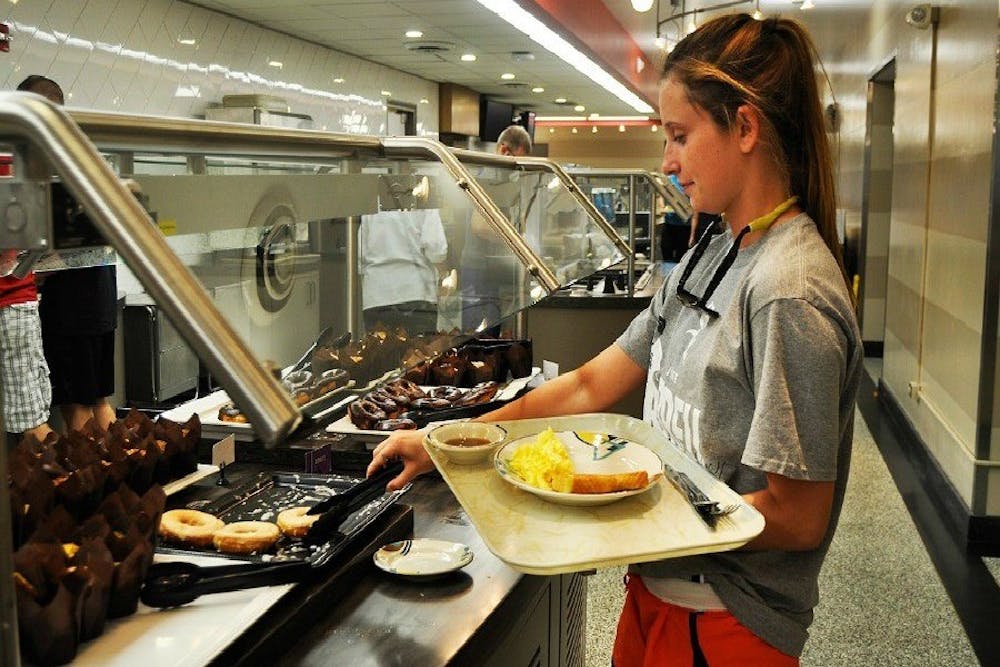Twice a week, I put on a very unflattering pair of black pants and make the short walk from Morris to MapleStreet Station. I grab an apron and swipe my ID to clock in, signaling the official start of a long three hours of work at First Stop.
If it's a good day, I'll walk into a quiet kitchen and empty dining room where a couple other student employees are rolling silverware, wiping tables and making small talk about the weekend.
On a typical day, I'll enter a chaotic prison full of frazzled employees who are unified only by their stress. I quietly pick up a dirty dish or a stray menu, trying not to be noticed by someone who could potentially assign me an unpleasant task. Often, the managers and other employees don't notice I've arrived.
But the students sitting in the dining room are always prompt in recognizing my arrival. They don't see another student, though. They see a person dressed in black, and therefore a person whose only purpose is to bring them the things they want. Do we employees wish that maybe they saw students who are no different than they are? Yeah. But we know that they're a little busy thinking about going out or group projects, because we think about those things, too.
They flag me down to make their requests. However, requests are often made in the form of statements, not questions.
"We want a booth. In the corner."
"We're ready to order."
"We've been waiting a long time for our food."
"I want my toast cut, but down the middle, not diagonally." Really?
"Every time I come here I have a problem. It's crazy." No, crazy is doing something over and over again and expecting a different result. She should just give up and stop coming.
One of the most common complaints is that it takes too long to get seated. What a lot of people don't get is that we don't enjoy watching them all line up and stand around forever waiting for pancakes. What we'd like to say is, "Really? This food is THAT good? THIS is what you want to spend your entire Saturday morning doing?"
If the answer to those questions is yes, fine. If you want to go over to full tables of people and tell them to eat their food faster and leave, we're cool with that. If not, you're gonna have to wait.
A commitment to making the customers happy is basically a euphemism for doing what you need to do to make them content enough to shut up. Regardless of what you want to call the action of giving them what they want, I do it. Depending on how polite they are, I'll sometimes even do it with a smile.
The people I refuse to give a smile to are the ones who forget that every student who works at a campus restaurant is no different than the students who eat at them. If last night was a great night in Oxford and you're a little hungover, chances are so are we. If you want to haggle us to get your food faster so you can make it to Beat the Clock, just remember that we would love to be there, too. If you're stressed during finals week and snap at us because you're grumpy, think about how we're also a little stressed. And, believe me, our experience at First Stop is a little more stressful than just coming in and being waited on.
I know that I get paid to wait on them, and I do it. Sometimes I just do it in an unorthodox way. What's surprising is that my bosses are pretty nice to me, even though they would have good reason not to be. They gently chide me when I give the middle finger to my friends in front of a full dining room of people. They softly suggest that maybe I shouldn't make a face when someone orders chocolate chip pancakes with Swiss cheese on them, even though they know it's hard to take an order like that without subconsciously expressing disgust.
So many students are also gracious and understanding. They say "please" and "thank you," just like their parents taught them. They smile when ordering and politely ask for the things they need. The students who are working recognize and appreciate this. We also recognize that sometimes it's true that people are waiting a really long time. Sometimes it's true that we've messed up or forgotten something or just aren't doing our jobs very well. What's always true is that being annoying doesn't work in your favor, and that we're your equals, so you should treat us as such.
Kerry McFadden
mcfaddkk@miamioh.edu

